27/10/24 - Maurizio Aluffi - the pioneer par excellence of the Trial in Central Italy
Maurizio Aluffi, born in 1956, one of the pioneers of the Italian Trial still active and in perfect shape. Not at all conditioned by the fact that he was born and lives near Rieti and therefore relatively far from the center of gravity of the widespread diffusion of Trials in Italy, represented by the North in general, he has always supported every initiative in favor of the specialty and has no intention of giving up in the present day.
A good level rider, event organizer, collector of Trial motorbikes, we retrace with him the most important moments of his trials career and analyze together the solutions for the survival of a sport so dear to us.
On the weekend of 5 and 6 October the ASI Trial Antico Trophy (TATA) closed its doors for the third consecutive year in Monte San Giovanni in Sabina, not far from where he lives. It goes without saying that the technical aspect of the event was entirely his work.
Tireless and stubborn - as one would expect a leader to be - he was not too concerned about some of the criticisms leveled against him for the marking out of sections which were later exacerbated by bad weather. A job that overall he knows how to do with mastery and intelligence but which he is now starting to feel the weight of...
When did you start in Trial? With what bike?
I started in 1970, I was 14 years old. I modified 50cc scooters to make them less fast but with more bottom end. I remember a Malanca with a Minarelli engine with which I did some crazy numbers. My first real Trial bike arrived in 1975, a Bultaco Sherpa 250. An incredible feeling: for a long time it was on the balcony so I could see it from my bedroom window...
Why the Trial? Who influenced your choice?
As a kid in my area, the Canera Valleys, the first scrambler motorbikes began to arrive, I immediately understood that you could travel the most difficult paths with your motorbike and you could climb the mountains with mechanical means. I already bought some magazines and every now and then they talked about Trial. Then some "Romans" began to arrive with the first Trial bikes, all Spanish. The passion took me to such an extent that while I was studying I went to work to buy one. In 1974 I made an agreement with a farm owner, my "second father", to go and work for him, in exchange I would have a new Bultaco. He too was passionate about it, so much so that we went and ordered the motorbike long before I received the payment. After months the much desired “creature” arrived.
Your most important sporting results?
I think I have participated in a thousand races! I won around twenty regional championships, perhaps as many "central-south" trophies, as they were called some time ago, a Montesa single-brand championship, a few classics, a two-day Supertrial in Valtellina. Many recognitions from the Italian Federation and the Provincial Committee.
And as an organizer?
I have been organizing competitions since the 80s, perhaps even before, I also brought the Trial to the then Terminillo ski resort, several Italian trials and also a European Championship, but the best event was the Italian Championship in Monte San Giovanni in Sabina in 2014. It looked like a world championship: 156 riders at the start, 5000 spectators. Something never seen before, the people of the town still remember it, this is a village with just over 500 inhabitants. Today I still thank my friend Sergio Parodi, who convinced me to organize it and then for the help he gave us. Unforgettable!
What does it mean to have a passion for a sport that is underdeveloped in your region? Long and expensive trips?
I have done everything in life and always with the utmost commitment. I have tried my hand at many disciplines, but Trial has remained in my heart. Passion has no boundaries, I have seen many young people approach this sport and then "escape", the Trial requires technique, effort, brain. You don't practice it for a living. It takes you into nature, it made me know and admire my mountains. It made me live at peace with myself. It made me spend a lot of money without regret. I never cared about the trips, the thousands and thousands of kilometres. What is passion? It's that feeling of pleasure that you can't do without. The desire to reach a goal, an objective.
Are you also a collector, how many motorbikes do you have?
I have around ninety historic motorbikes and around ten modern ones. At a certain point in my life I decided to put in the garage all the bikes I raced with and the ones I wanted and at the time they didn't even arrive in Italy. I'm definitely in a good place! But I'm not done yet.
What is your family made up of? Have they hindered or favored you in your passion?
There are three of us in the family even though my son Giorgio decided to move to Rieti a while ago. He was a promising Trials rider and a good basketball player. He started with the Trial very early, then suddenly decided to stop. He trained little, but he was very strong. He didn't have my passion!
Cinzia, my wife, rode the Trial motorbike. I can't say that she was in love with this sport, but I can't say that she hated it either! She has never hindered my passion even though I don't share what she would call "fixation".
The friendship with the wife of some pilot meant that she came back to keep me company, especially on longer trips. She often insults me by not being able to understand what I should do with all the motorbikes scattered everywhere, eh... I guess I can't blame her!
Why the Vintage Trial? Is it better than modern Trial?
The vintage Trial took me back to the good times of the Trial, when you went everywhere. My first experiences were motorbike mountaineering. We left early in the morning and never knew when we would return. Friendship, the group, first of all. The modern Trial is too exasperated, it doesn't include but excludes... Too much pseudo professionalism, not to mention the Federation's bureaucracy, which really nauseated me. From this year I have decided not to participate in modern Trial races anymore, I don't enjoy it anymore, so I'm saying enough is enough. With TATA I have found many enthusiasts, many friends, with whom I can share a passion that age has not affected.
What are the differences between vintage trials and modern trials?
There is a substantial difference between the vintage Trial and the modern Trial: the first aims to entertain the rider, the second focuses more on the spectacle, on the height of the obstacle. Certainly smaller spaces for the modern one, so you can follow the race with limited movements. Attention to the landscape, to the length of the loop, to the pleasure of "experiencing" the place, for the latter.
Of course, we must also take into account the technological evolution whereby the lighter and more high-performance motorbike allows you to overcome more challenging obstacles.
How difficult is it to get both to coexist in the same race?
It is very difficult to coexist in the same race vehicles that were born in the 70s or before, with those of today. We tried a couple of times by combining a Central-South Trophy race and a race with Group 5(previous Vintage Italian championship). The result personally didn't satisfy me. The way of tracking and conceiving the race is too different. Although I am not against coexistence, I believe that owners of modern motorbikes must adapt and not vice versa.
How do you see the future of Trial?
The future of the Trial has many unknowns. The causes? The vehicles are too specialized, they do not allow use other than "racing". But spaces are the problem that most impacts the diffusion of the Trial. Too many bans, often unjustified, in some areas actually make the practice illegal. Salvation is or should be the authorized areas, which is not easy to achieve and is not always well received by municipal administrations. In 2024, perhaps there will not be more than a thousand trial bikes sold, we are talking about nothing, so no one invests in this sport anymore.
What do you like and dislike about TATA?
TATA was a great insight. I like it, I was happy to be part of the Committee, from 2025 I would like to participate more assiduously. We just need to improve in trying to homogenize the races a bit, perhaps an inspector with decision-making power wouldn't be a far-fetched idea. We need to coordinate with the organizing clubs for which I have total respect. I know what it means to organize a race. However, I accept what I find, I don't like to cause controversy, I'm only interested in having fun and not getting hurt.
What do you think of the Vintage movement in Italy?
In Italy there are many "old" motorbikes, the movement is still marginal but is growing. The numbers for this 2024 are discreet. Perhaps there is a different mentality than that of the Spanish, French, etc. There is the exasperated search for the final result, not to participate and have fun.
Are there enough races? Is it confused with the modern Trial?
There aren't too many races. Each has its own story. You have to pay attention to the calendar. For us who travel thousands of kilometres, it is not possible to schedule four days of competition in fifteen days, or less. However, I believe that 4/5 two-day races are more than enough for a national championship/trophy.
The vintage Trial is often seen as a party, almost a type of fun race. It's a bit belittling for the specialty, don't you think?
There is a competitive aspect in every competition and the rules are important for the correct running of the event. We shouldn't exaggerate though, we are always talking about amateur races where the ranking should be considered a secondary factor. We are friends and for me it is a value, often even outside the competition field. I don't find any humorous streak in it and the specialty is not diminished by it. I rather believe that it is too much competitive spirit that keeps enthusiasts away.
We from the central-south are trying to form a group because we get along well, we put in a bit of our own, such as the culinary aspect, typical-traditional of our lands, I don't think it's wrong also because the Trial that I knew when I started had other characteristics...
What can be done to increase the number of practitioners?
I'm not convinced that big numbers are synonymous with a good race. For those who organize it, it would be an additional problem that would only benefit the club coffers. I hate queues, so I think the right goal is a hundred riders, every race. We are far from these numbers in Italy.
Each of us should contribute to creating moments to make known what the Trial was like in the 70s and 80s, collective training, internships, schools, etc. A Trial closer to the people, more "human", where you can have fun without taking particular risks. Personally, I am also available to "lend" a few motorbikes to get you started.
In addition to the Trial? Do you play other sports? What are your hobbies?
Trial has been and remains my passion, but in general I like mechanics, engines and everything off-road but with particular attention to respect for nature. I hate the behavior of those who think that everything is allowed. Incalculable damage is done with JEEPs, but even certain types of Enduro riders are no different.
Trial is the least impactful, most ecological motor sport, but I never thought that you could go anywhere. We need rules and respect. Other sports? Yes, the MTB and especially the E-bike, but on mountain paths, not dirt roads, roads or cycle paths. A few years ago I started trekking, long walks to discover the Apennines, especially that of central Italy. It's a way to reconnect with a world that I had forgotten, or perhaps I had never known.
I love the mountains, I respect them, I admire them: it's my life.
---------------------------------------------------------------------------------------
Maurizio Aluffi , il pioniere per eccellenza del Trial in Centro Italia
Maurizio Aluffi, classe 1956, uno dei pionieri del Trial Italiano ancora in attività ed in perfetta forma. Per nulla condizionato di essere nato e di vivere vicino a Rieti e quindi relativamente lontano dal centro di gravità della grande diffusione del Trial in Italia, rappresentata dal Nord in generale, ha sempre appoggiato ogni iniziativa a favore della specialità e non ha intenzione di mollare nei giorni nostri.
Pilota di buon livello, organizzatore di eventi, collezionista di moto da Trial, ripercorriamo con lui i momenti più importanti della sua carriera trialistica e analizziamo insieme le soluzioni per la sopravvivenza di uno sport a noi così caro.
Nel week-end del 5 e 6 ottobre il Trofeo ASI Trial Antico (TATA) ha chiuso i battenti per il terzo anno consecutivo a Monte San Giovanni in Sabina, non lontano da dove vive. Inutile sottolineare che l'aspetto tecnico dell'evento è stata tutta opera sua.
Infaticabile e caparbio – come si adduce a un leader – non si è preoccupato molto di alcune critiche mossegli per la tracciature di zone poi inasprite dal brutto tempo. Un lavoro che complessivamente sa fare con maestria e intelligenza ma di cui ora inizia a sentirne il peso …
Quando hai iniziato nel Trial? Con che moto?
Ho iniziato nel 1970, avevo 14 anni. Modificavo i motorini 50cc per renderli meno veloci ma con più tiro ai bassi. Ricordo un Malanca con motore Minarelli con cui facevo dei numeri pazzeschi. La mia prima vera moto da Trial è arrivata nel 1975, una Bultaco Sherpa 250. Un'emozione incredibile: per lungo tempo è stata sul balcone in modo da poterla vedere dalla finestra della mia camera...
Perchè il Trial? Chi ha influito sulla tua scelta?
Da ragazzino dalle mie parti, le Valli del Canera, iniziavano ad arrivare le prime moto da regolarità, capii da subito che si potevano percorrere i sentieri più impervi con la moto e si poteva salire in montagna con mezzi meccanici. Compravo già qualche rivista e ogni tanto si parlava di Trial. Poi qualche “romano” inizio a venire con le prime moto da Trial, tutte spagnole. La passione mi prese a tal punto che mentre studiavo andavo a lavorare per comprarmene una. Nel 1974 mi accordai con un proprietario di una azienda agricola, il mio “secondo padre”, per andare a lavorare da lui, in cambio avrei avuto una Bultaco nuova. Si appassionò anche lui, tanto che andammo ad ordinare la moto molto prima che maturassi il corrispettivo. Dopo mesi arrivò la tanto desiderata “creatura.”
I tuoi risultati sportivi più importanti?
Ho partecipato penso ad un migliaio di gare! Ho vinto una ventina di campionati regionali, forse altrettanti trofei “centro-sud”, come erano denominati qualche tempo fa’, un monomarca Montesa, qualche classica, una Due giorni Supertrial in Valtellina. Tanti riconoscimenti dalla FMI e dal Comitato provinciale.
E come organizzatore?
Organizzo gare dagli anni 80, forse anche prima, ho portato il Trial anche nell’allora stazione sciistica del Terminillo, diverse prove d’Italiano e anche un Europeo, ma l’evento più bello è stato il Campionato Italiano a Monte San Giovanni in Sabina nel 2014. Sembrava un mondiale: 156 piloti al via, 5000 spettatori. Una cosa mai vista, la gente del paese lo ricorda ancora, questo è un borgo con poco più di 500 abitanti. Ringrazio ancora oggi il mio amico Sergio Parodi, che mi convinse ad organizzarlo e poi per l’aiuto che ci diede. Indimenticabile!
Cosa significa avere la passione per uno sport poco sviluppato nella tua regione? Lunghe e onerose trasferte?
Nella vita ho fatto tutto e sempre con il massimo impegno. Mi sono cimentato in tante discipline, ma il Trial mi è rimasto nel cuore. La passione non ha confini, ho visto tanti giovani avvicinarsi a questo sport e poi “fuggire”, il Trial richiede tecnica, fatica, cervello. Non lo si pratica per vivere. Ti porta dentro la natura, mi ha fatto conoscere ed ammirare le mie montagne. Mi ha fatto vivere in pace con me stesso. Mi ha fatto spendere, senza rimpianto, tanti soldi. Delle trasferte, delle migliaia e migliaia di chilometri non me ne è fregato mai niente. Cos’è la passione? E’ quella sensazione di piacere di cui non puoi fare a meno. Il desiderio di raggiungere un traguardo, un obbiettivo.
Sei anche un collezionista, quante moto hai?
Ho una novantina di moto storiche ed una decina di quelle moderne. Ad un certo punto della mia vita ho deciso di mettere in garage tutte le moto con cui ho fatto gare e quelle che avrei voluto e all’epoca non arrivavano nemmeno in Italia. Sono decisamente a buon punto! Ma non ho ancora finito.
La tua famiglia come è composta? Ti hanno ostacolato o favorito nella tua passione?
In famiglia siamo in tre anche se da un po' mio figlio Giorgio ha deciso di trasferirsi a Rieti. Era un promettente pilota di Trial e un bravo giocatore di basket. Con il Trial cominciò prestissimo, poi improvvisamente decise di smettere. Si allenava poco, ma era molto forte. Non aveva la mia passione!
Cinzia, mia moglie, ha guidato la moto da Trial. Non posso dire che fosse innamorata di questo sport, ma nemmeno che lo odiasse! Non ha mai ostacolato la mia passione pur non condividendo quella che lei definirebbe "fissazione".
L'amicizia con la consorte di qualche pilota ha fatto si che tornasse a farmi compagnia, specie nelle trasferte più lunghe. Spesso mi insulta non riuscendo a capire cosa ci debba fare con tutte le moto sparse in ogni luogo, eh... direi che non posso dargli tutti i torti!
Perchè il Trial d'epoca? E' meglio del Trial moderno?
Il Trial d’epoca mi ha riportato ai tempi belli del Trial, quando si andava ovunque. Le mie prime esperienze sono state il moto-alpinismo. Si partiva la mattina presto e non si sapeva mai l’ora del ritorno. L’amicizia, il gruppo, prima di ogni cosa. Il Trial moderno è troppo esasperato, non include ma esclude...Troppo pseudo professionismo, per non parlare della burocrazia della Federazione, che mi ha veramente nauseato. Da quest’anno ho deciso di non partecipare più a gare di Trial moderno, non mi diverto più, quindi dico basta. Con il TATA ho ritrovato tanti appassionati, tanti amici, con cui posso condividere una passione che l’età non ha scalfito.
Quali sono le differenze tra Trial d'epoca e Trial moderno?
Tra il Trial d’epoca e il Trial moderno c’è una differenza sostanziale: il primo ha come obiettivo di far divertire il pilota, il secondo bada più allo spettacolo, all’altezza dell’ostacolo. Spazi sicuramente più ristretti per il moderno, in modo da poter seguire la gara con spostamenti limitati. Attenzione al paesaggio, alla lunghezza del trasferimento, al piacere di “vivere” il luogo, per l’epoca.
Certo bisogna anche tener conto dell’evoluzione tecnologica per cui la moto più leggera e performante consente di superare ostacoli più impegnativi.
Quanto è difficile far convivere entrambi nella stessa gara?
Molto difficile far convivere nella stessa gara mezzi che sono nati negli anni 70 o prima, con quelli dei giorni nostri. Ci abbiamo provato un paio di volte abbinando una gara di Trofeo Centro-Sud e una gara con il Gruppo 5. Il risultato personalmente non mi ha soddisfatto. Troppo diverso il modo di tracciare, di concepire la gara. Anche se non sono contrario alla convivenza credo che siano i possessori di moto moderne a doversi adeguare e non viceversa.
Come vedi il futuro del Trial?
Il futuro del Trial ha molte incognite. Le cause? I mezzi sono troppo specialistici, non consentono un utilizzo diverso da quello “corsaiolo”. Ma sono gli spazi il problema che più impatta sulla diffusione del Trial. Troppi divieti, spesso ingiustificati, in alcune zone ne rendono di fatto illegale la pratica. La salvezza sono o dovrebbero essere le aree autorizzare, cosa non facile da ottenere, non sempre ben viste dalle amministrazioni comunali. In questo 2024 forse non si supereranno le mille immatricolazioni, parliamo del nulla, per cui nessuno investe più in questo sport.
Cosa ti piace e cosa non del TATA?
Il TATA è stata una bella intuizione. Mi piace, ho fatto parte con piacere del Comitato, dal 2025 vorrei partecipare con più assiduità. Dobbiamo solo migliorare nel cercare di omogenizzare un po’ le gare, forse un verificatore con potere decisionale non sarebbe un’idea peregrina. Bisogna coordinarsi con i club organizzatori di cui ho un rispetto totale. So cosa significa organizzare una gara. Comunque accetto quello che trovo, non mi piace fare polemiche, mi interessa solo divertirmi e non farmi male.
Come ti sembra il movimento Vintage in Italia?
In Italia ci sono tante “vecchie” moto, il movimento è ancora marginale ma cresce. I numeri di questo 2024 sono discreti. Forse c’è una mentalità diversa da quella dei Spagnoli, Francesi, ecc. C’è la ricerca esasperata del risultato finale, non di partecipare e di divertirsi.
Ci sono abbastanza gare? Si confonde col Trial moderno?
Non ci sono troppe gare. Ognuna ha una sua storia. Bisogna fare attenzione al calendario. Per noi che percorriamo migliaia di chilometri non si possono mettere in programma quattro giornate di gara in quindici giorni, o meno. Credo comunque che 4/5 gare di due giorni siano più che sufficienti per un campionato/trofeo nazionale.
Spesso il Trial vintage lo si vede come una festa , quasi un tipo di gara goliardica. E' un po' sminuente per la specialità, non trovi?
L’aspetto agonistico c’è in ogni competizione e le regole sono importanti per il corretto svolgimento dell’evento. Non bisogna esagerare però, stiamo sempre parlando di gare amatoriali dove la classifica dovrebbe essere considerata un fattore secondario. Siamo amici e per me è un valore, spesso anche fuori dal campo di gara. Non ci trovo nessuna vena goliardica e la specialità non ne viene sminuita. Credo piuttosto che sia il troppo agonismo che tiene lontano il popolo degli appassionati.
Noi del centro-sud stiamo cercando di fare gruppo perché si sta bene insieme, ci mettiamo un po’ del nostro, tipo l’aspetto culinario, tipico-tradizionale delle nostre terre, non credo sia sbagliato anche perché il Trial che ho conosciuto io quando ho iniziato aveva altre caratteristiche...
Cosa si può fare per aumentare i praticanti?
Non sono convinto che i grandi numeri siano sinonimo di una bella gara. Per chi organizza sarebbe un problema in più che gioverebbe solo alle casse dei club. Odio le file, quindi credo che l’obiettivo giusto sia un centinaio di piloti, ogni gara. Siamo lontani da questi numeri in Italia.
Ognuno di noi dovrebbe contribuire a creare dei momenti per far conoscere com’era il Trial degli anni 70-80, allenamenti collettivi, stage, scuole ecc. Un Trial più vicino alla gente, più “umano”, dove ci si può divertire senza correre particolari rischi. Personalmente sono anche disponibile a “prestare” qualche moto per iniziare.
Oltre al Trial? Pratichi altri sport? Quali sono i tuoi hobby?
Il Trial è stata e rimane la mia passione, ma in generale mi piace la meccanica, i motori e tutto quello che è fuoristrada ma con particolare attenzione al rispetto per la natura. Odio il comportamento di chi pensa che tutto è consentito. Con le JEEP si fanno danni incalcolabili, ma anche certi tipi di enduristi non sono da meno.
Il Trial è lo sport motoristico meno impattante, più ecologico, ma non ho mai pensato che si possa andare ovunque. Ci vogliono regole e rispetto. Altri sport? Si, la MTB e soprattutto l'E-bike, sui sentieri di montagna però, non sterrati, strade o piste ciclabili. Da qualche anno ho iniziato a fare trekking, lunghe camminate alla scoperta dell’Appennino, specie quello del centro Italia. E’ un modo per riconnettersi con un mondo che avevo dimenticato, o forse non avevo mai conosciuto.
La montagna, la adoro, la rispetto, l’ammiro: è la mia vita.
------------------------------------------------------------------------------------------
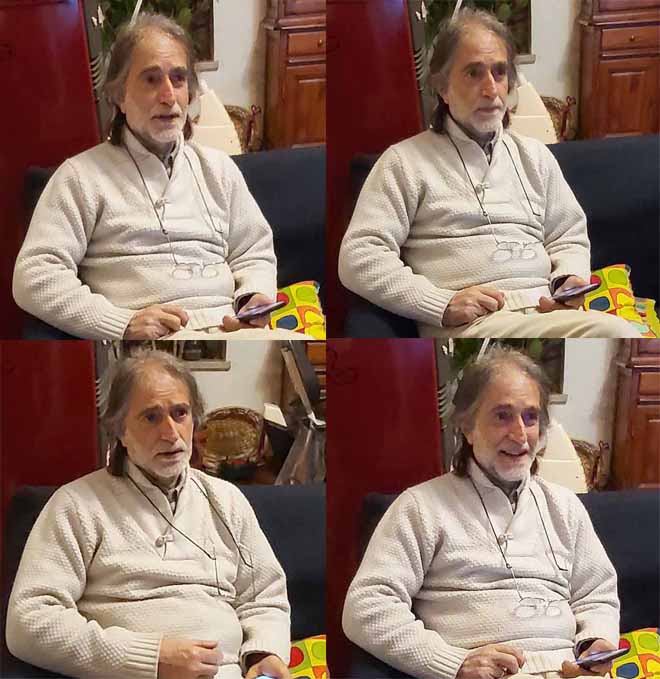
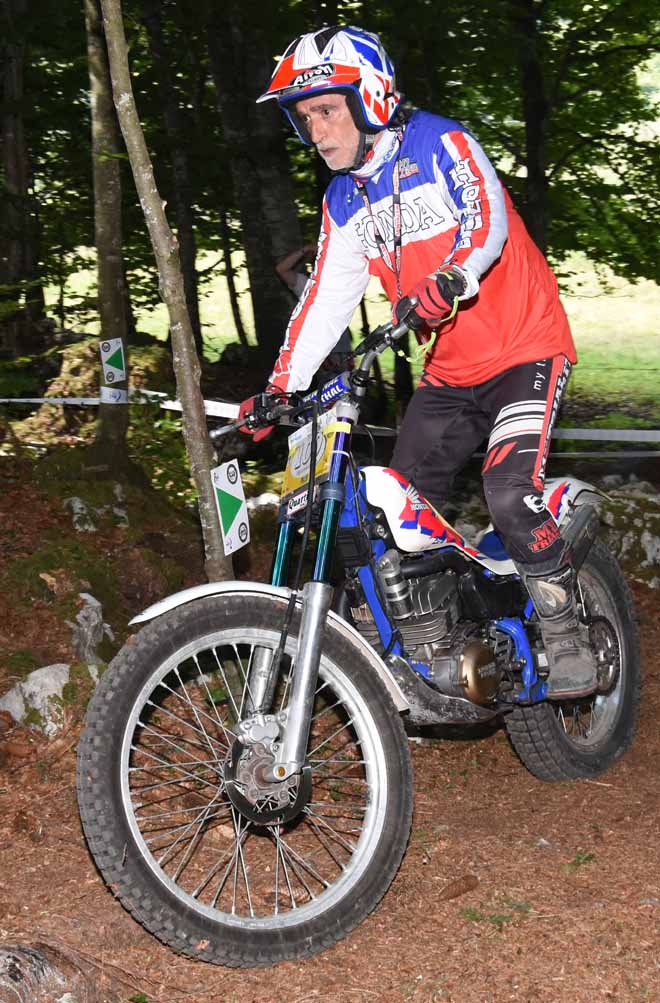
2022: su Honda TLM 260 a Cartignano (CN), TATA
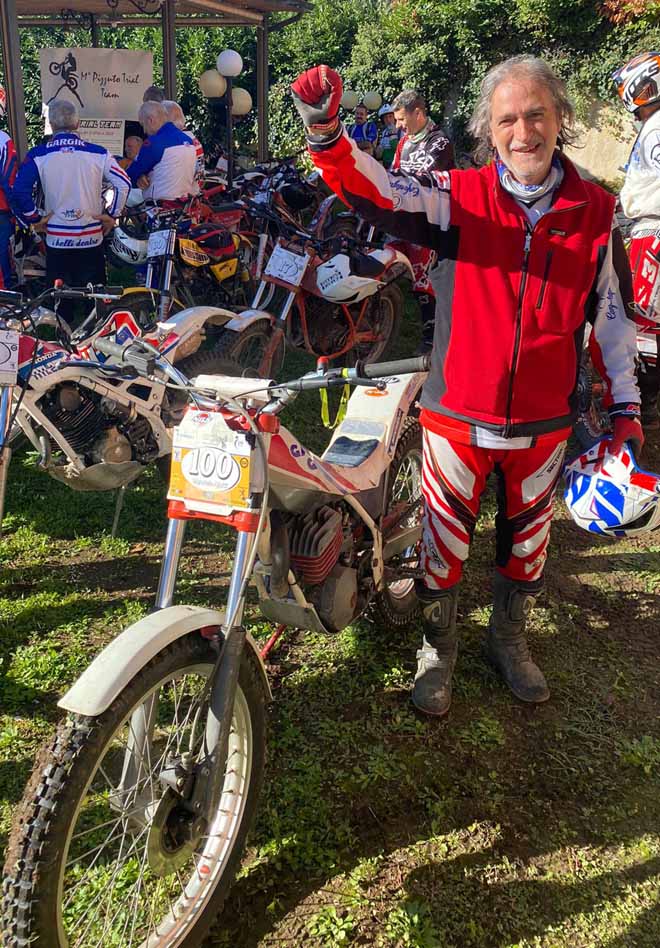
2021: su Gas Gas Halley 250 a San Giovanni in Sabina (RI), TATA
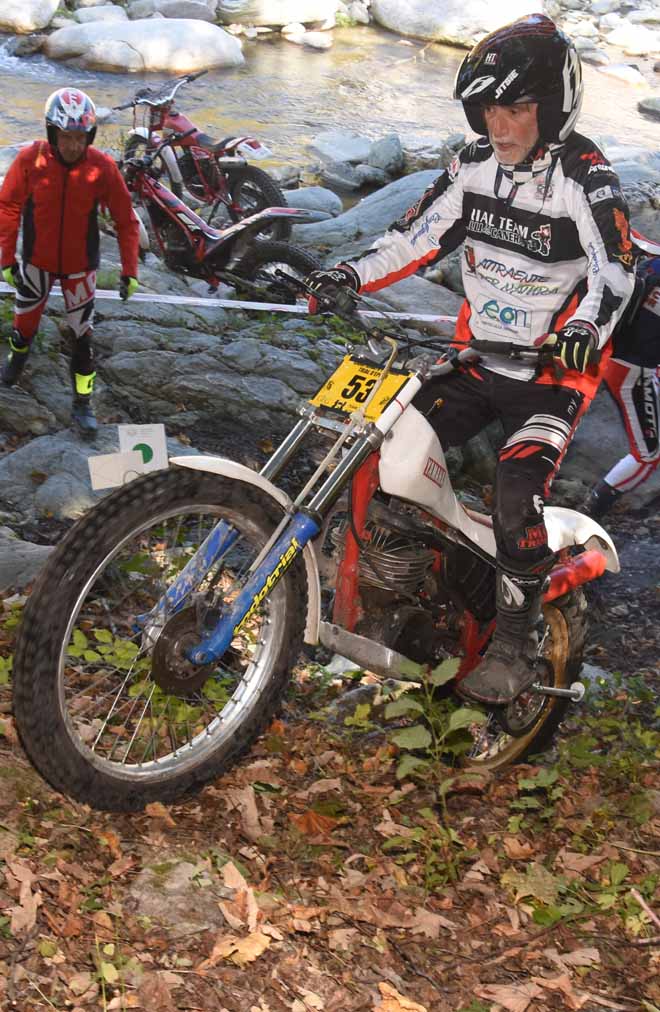
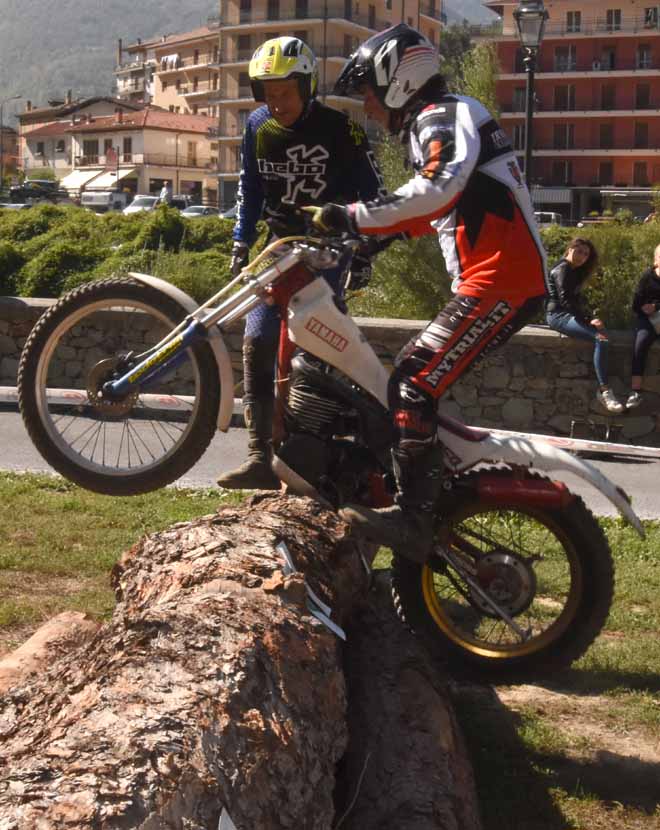
2018: su Yamaha TY 250 R ad Ormea (CN), Campionato Italiano Gruppo5
insieme a Marco Marranci (sx) , Mario Candellone e Luca Perfetti (dx) a Ormea, 2018
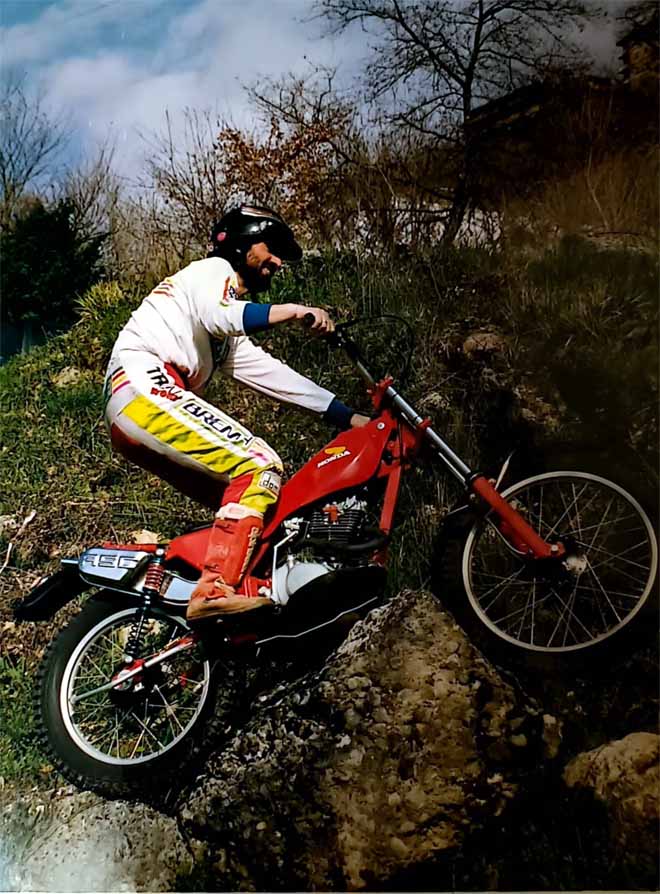
1992: su Honda XL 250 a Sora (FR)
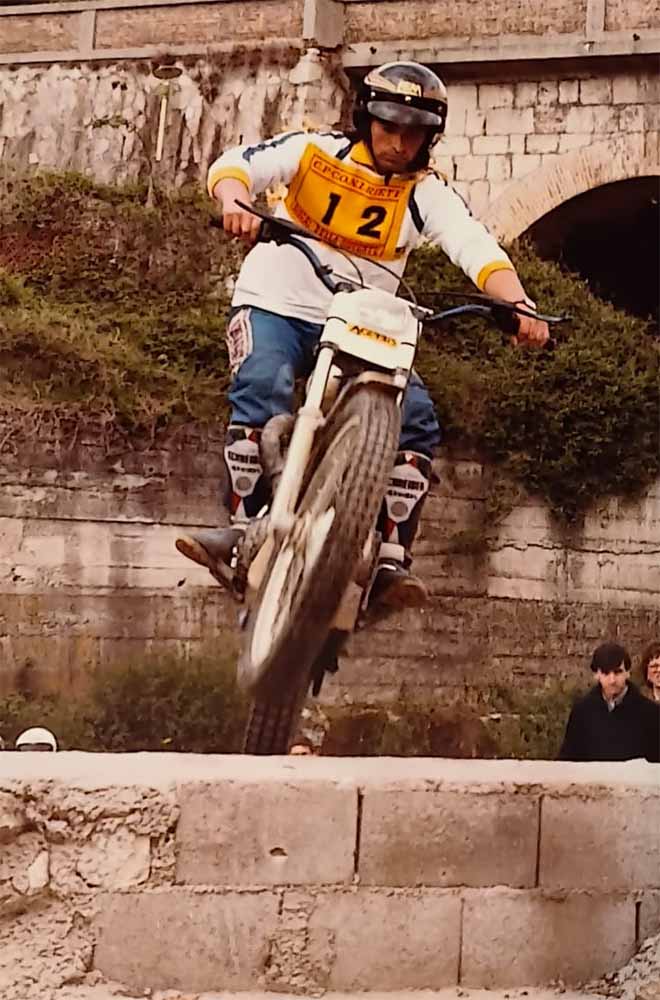
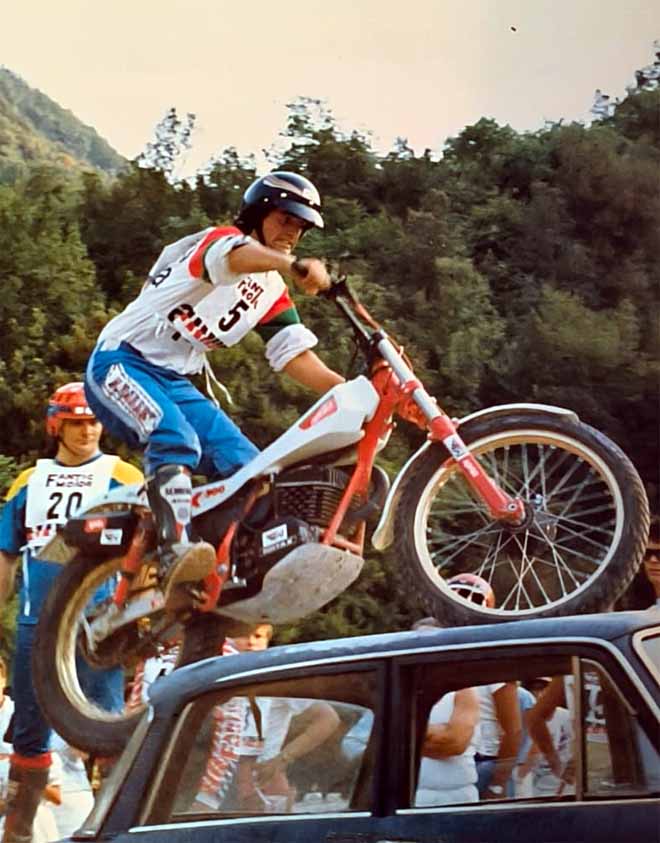
1985: in gara sull'Aprila TX 300
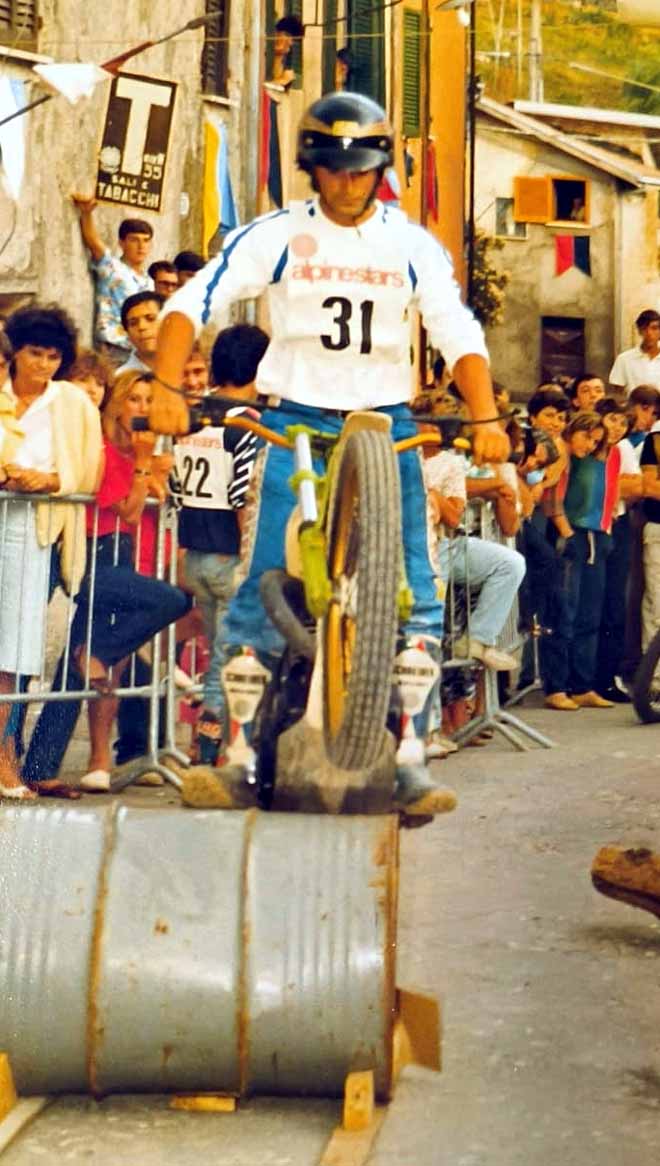
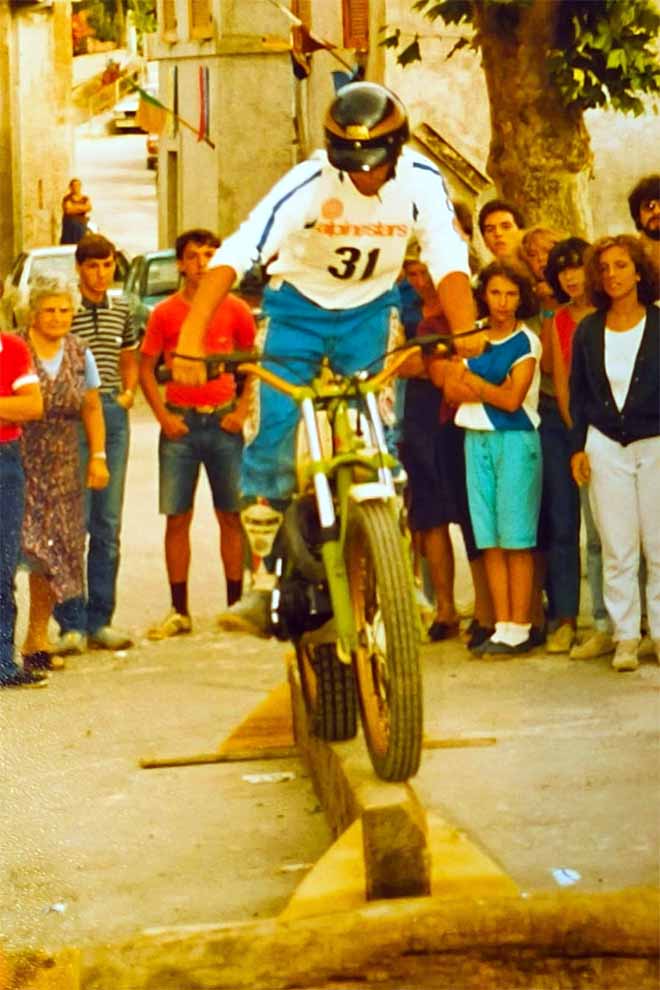
1983: su Italjet T Piuma in una zona indoor a Rieti
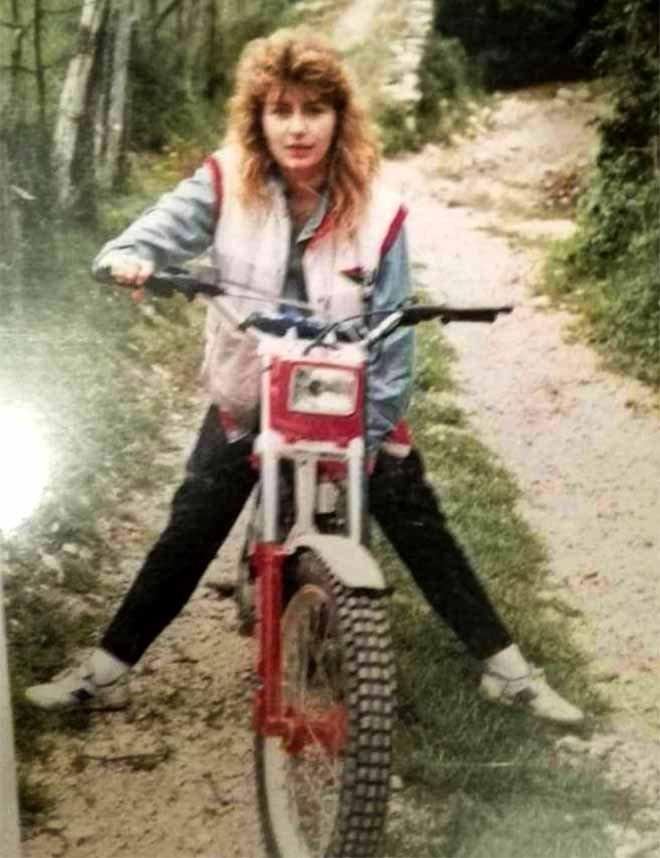
Cinzia Francia, sua moglie quando praticava nel 1982
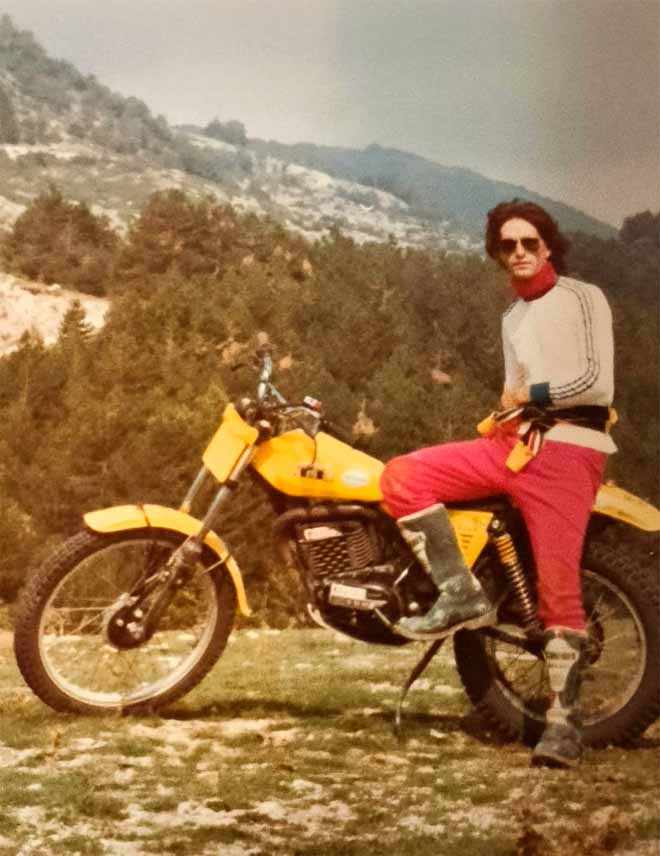
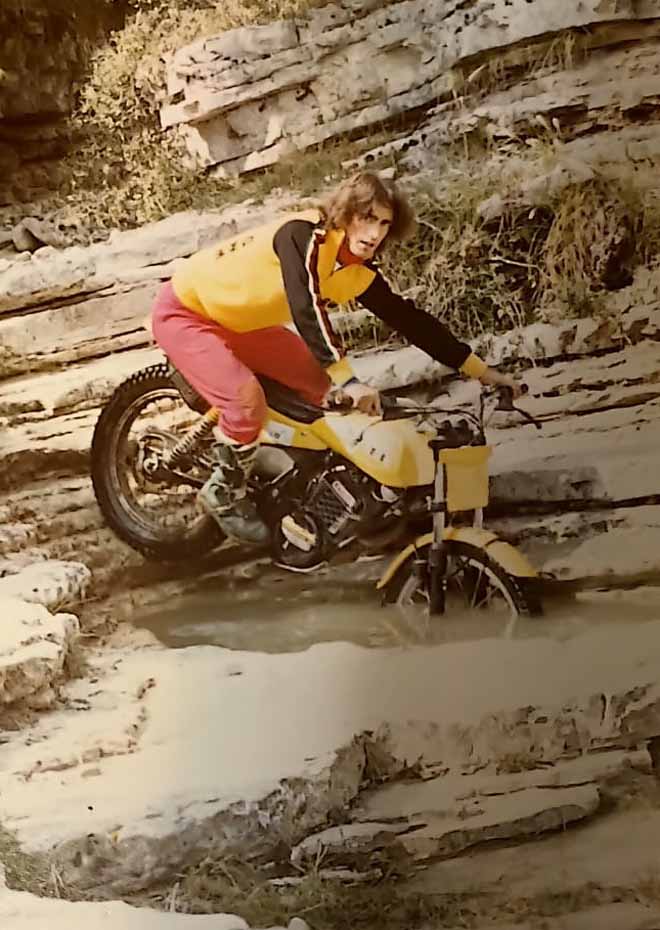
1982: in allenamento su SWM 320 TL ...
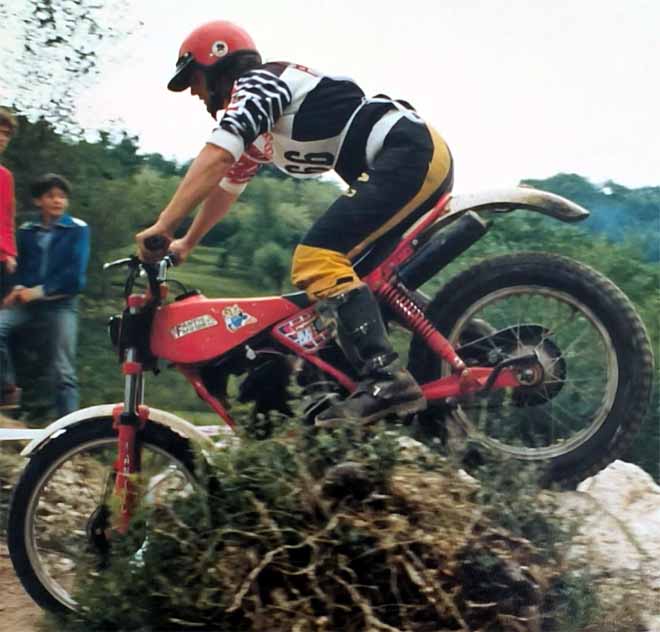
1981: in gara su Fantic 240 ...
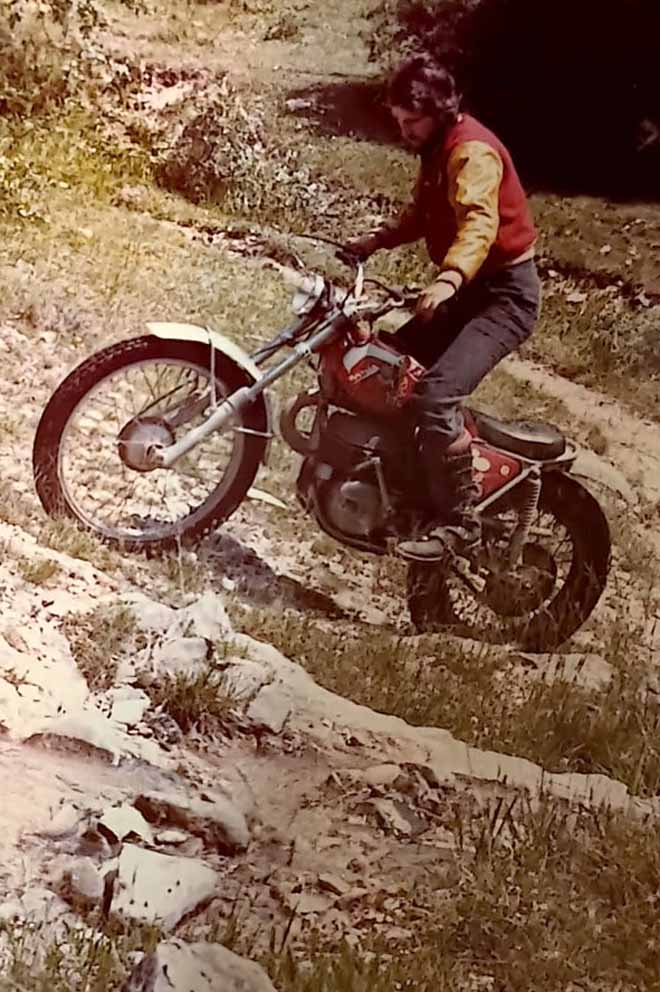
1975: sul suo primo Bultaco Sherpa 250...
---------------------------------------------------------------------------------------

